Colic: A Pain in the Gut
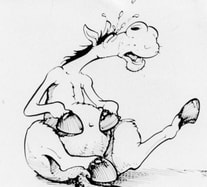
Time: 1:30-3:30
Location: Licking County Library Main branch
101 W. Main St.
Newark, OH 43055
Cost: FREE
RSVP (below) appreciated
Colic: A Pain in the Gut
We are back again, this time with a tag-team talk with Dr. Lauren McPherson to talk about colic, the number one killer of horses. Come learn some basic anatomy and then delve into what can go wrong, as well as some diseases that can mimic colic signs. Learn signs of colic and what you can do to prevent it. Lastly, we will have a guest speaker from ASPCA Pet Health Insurance to discuss equine medical insurance. As always, snacks will be provided.

Date: Saturday, January 18
Time: 1:30-3:30 Location: Licking County Library Main branch 101 W. Main St. Newark, OH 43055 Cost: FREE RSVP (below) appreciated
0 Comments
It's that time of year again! Join us for a discussion on common myths in equine health care as well as a brief talk about how to become your veterinarian's favorite client. As always, snacks will be provided and admission is free. Bring your questions and your friends. RSVP appreciated
Date: Sunday, January 28th Time: 2:00-4:00 Location: Newark Public Library 101 W Main St. Newark, OH 43055 Cost: FREE  When is a horse considered to be a senior? What are special concerns regarding diseases, vaccines, dentistry, deworming and nutrition? Dr. Snedden will answer all of these topics and more with time left over to answer your questions. Admission is free and refreshments will be provided, plus you will have a chance at some fabulous door prizes. Everyone is welcome so bring a friend! Date: Sunday, February 19, 2017 Time: 2:00-4:00 Location: Newark Public Library 101 W Main St. Newark, OH 43055 Thank you to everyone who showed up on a beautiful 64 degree day in January in Ohio. We appreciate your support. Mark your calendars for February 19th from 2-4 for a second seminar (topic to be determined). 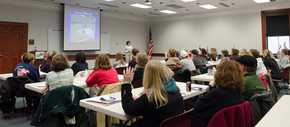 it's cold outside so come on in and and join our annual educational talks! We will be kicking off the new year with a discussion of "winter horse care". Questions about blanketing or feeding your senior horse...we will cover all this and more. Bring a friend and your questions. As always, snacks will be provided. Date: Sunday, January 22, 2017 Time: 2:00 - 4:00 pm Where: Newark Public Library 101 W Main St. Newark, OH 43055 Cost: FREE  Looking for the perfect gift for horse owning friends/family; would you just like to give your horse something nice for Christmas? Check out FHVP gift certificates for some of our most popular services. Lock in discounted prices* now and use any time in 2015. Click here to go to our "store" page and choose the service you would like to purchase. You can pay online using Paypal or simply contact us via phone or e-mail, and arrange payment. Act soon, gift certificates at these prices will only be offered until December 31. *Prices do not include call fees which can be waived if the horse is brought to FHVP in Thornville. 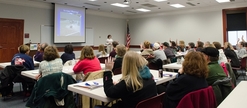 Let's face it, winter in Ohio is often not much fun for riding. It is however a good time to stay inside and increase your knowledge on horse health. Join us at the Newark Public Library (101 West Main St., Newark, OH) January 10th & February 7th from 2-4 pm for educational seminars regarding equine health. These seminars are free of charge and snacks will be provided. Equine Veterinary Medical Manipulation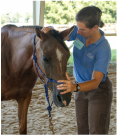 You may have read that Dr. Snedden just received her certification in Equine Veterinary Medical Manipulation. This seminar is your chance to get more information such as how it works, what conditions manipulation can help, when it may not help, what to look for when choosing a practitioner and much more. Thank you to everyone who attended our first owner education seminar of the year. We look forward to seeing you in February! Back to Basics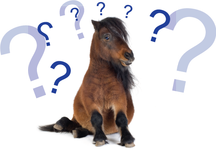 Are you a new horse owner or maybe you have owned horses for years but feel like you are sometimes in over your head when it comes to health issues. This is your chance to go back to the basics (or visit them for the first time). We will touch on many aspects of horse care including deworming, nutrition, vaccines, how to do a basic physical exam and when to call the vet. Attendees will receive a gift certificate for a free fecal exam. 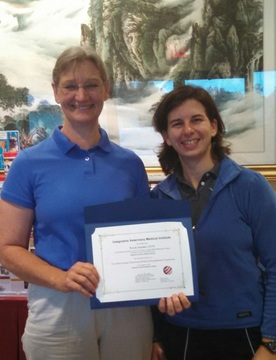 You may have heard, that I recently received my certification in Equine Veterinary Medical Manipulation (EVMM) from the Integrative Veterinary Medical Institute. I hope your first thought is “Congratulations” and I bet your second thought is “what is that?” By law, the only people who can call themselves chiropractors are those who have gone through professional school to earn their Doctrate of Chiropractic (DC). Unless you are a chiropractor, you cannot do chiropractic work*. (This is as it should be, I know I would be rather upset if the average Joe went around vaccinating horses and calling himself a veterinarian). Given that distinction, what I do is very similar to what chiropractors do on people; I simply work on horses instead. 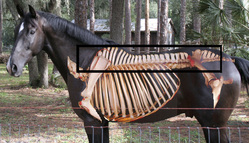 The following is a brief list of questions and answers regarding EVMM. A horse’s spine is huge and buried deep in inches of muscle, how can you possibly “pop” his bones back in place? While it is easy to explain that there is a bone out of place and we are pushing it back where it belongs; that is a gross oversimplification and not at all accurate. If the horse’s bones were actually out of place, it would constitute a veterinary emergency and would be visible on radiographs. The restrictions that I palpate involve muscles that have tightened on one part of a joint causing it to lose its normal range of motion. Most corrections are small, fast movements meant not to move bones, but instead to activate the nervous system, resetting those tight muscles to allow normal joint range of motion. This is why manipulations are not about strength but rather speed and accuracy. 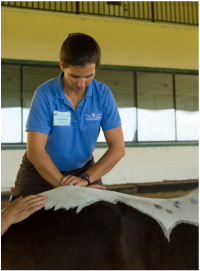 What does an exam and treatment look like? Treatment begins with a history of the horse, current issues under saddle and an exam at the walk. While trotting is great for looking at lameness, the spine actually moves more at the walk making it better for evaluation. Next comes a brief check of the cranial nerves and motion palpation of the entire body, starting at the temporomandibular joint and hyoid bone, continuing down the neck and back with special attention paid to each rib head, the sacroiliac region and pelvis. Beyond looking at the axial skeleton there are stops in between to manipulate all of the joints of both front and rear legs. Abnormalities in the motion of the joints along the way are generally corrected at the same time. 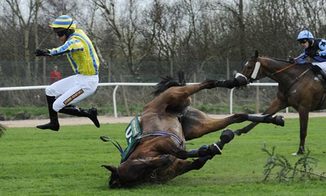 Are there any horses that should not be adjusted? Yes definitely! -Horses showing signs of neurologic impairment (especially with a history of recent trauma) should have their necks radiographed prior to manipulation as a fractured vertebrae could become displaced even with mild manipulation. -Recent trauma, even without neurologic signs may not respond well to manipulation. Ideally we would like to wait 5-7 days to allow inflammation to decrease so the true underlying problems can be determined. 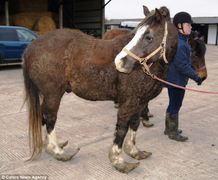 -Lastly, while not a true contraindication, horses with excessively long toes or underlying lameness will not hold adjustments well as they constantly position themselves to compensate for this foot imbalance or discomfort. Money may be better spent addressing the underlying issue before manipulation is attempted. Now that you have heard my side of the story, I would love to hear your comments as well as any other questions you have. Please send me e-mails with your questions or comments at [email protected]. I also plan to offer a free client education course on EVMM in January so keep an eye on my website and Facebook page for details. *As a side note, if you hear of a Dr. Snedden who is a chiropractor, that is my brother, Dr. Cale who works at the Montonya chiropractic center on 21st street in Newark. I highly recommend his services. 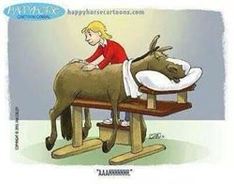 Dr. Snedden is currently completing coursework to become certified in equine spinal manipulation. You may ask the difference between spinal manipulation and chiropractic. It's pretty simple really,to be considered a chiropractor, one needs to attend a 3-4 year postgraduate school and graduate with a Doctrate of Chiropractic (DC), which then allows you to earn your living working on people. In order to treat animals, both DVMs and DCs need further education. While there are several animal spinal manipulation courses open to both DVM's and DC's focusing on both horses and dogs, Dr. Snedden, has chosen to attend the Integrative Veterinary Medicine Institute in Florida which is only open to DVM's and focuses solely on horses. The first session, focusing on the head and neck, consisted of 20 hours of lecture and 10 hours of lab covering not only the theory of spinal manipulation (it's not really about putting bones back in place), but also delved into topics such as the interrelations between dentistry and the spine, as well as dissection and ultrasound labs to refresh a solid understanding of the applicable anatomy. Check out Dr. Snedden's facebook posts from the first trip for some relevant tips for evaluating your own horse. We want to hear from you! Have you had experience with equine spinal manipulation in the past? What were the results? What questions to you have for us? 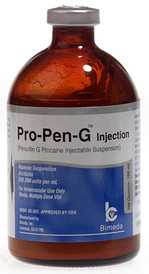 In the 1950's penicillin was a wonder drug, today any Tom, Dick or Harry can show up to the local feed store and pick some up, but do they know how to safely and effectively use it? Here's a hint, as an equine veterinarian seeing a fair amount of sick and/or injured horses, I probably only prescribe penicillin 2-4 x PER YEAR. Here are a few reasons why: 1) There are often better choices available. While penicillin can still be a very effective drug, it actually has a pretty narrow spectrum of bacteria against which it is effective. If you don't have a reasonable idea of which bacteria you are dealing with, or don't pair penicillin with another drug with a complementary spectrum of action, it may well be useless. 2) Penicillin is thick which means you need to you a larger bore needle for administration (which horses become progressively less appreciative of over time) 3) It needs to be given in relatively large and frequent doses (~ 30 mL 2x/day). (I find it exceedingly frustrating when I get am told that the horse has been receiving 10 mL 1x/day as this is only causing discomfort for the horse and contributing to antibiotic resistance) Last and most importantly 4) PENICILLIN CAN KILL YOUR HORSE! Yest that's right. Procaine Penicillin G if given in the vein (or even if given in the muscle in an inflamed area where it can quickly migrate into the blood stream) will cause a reaction which can range from the horse blindly walking or running into anything or anyone in it's path for several never ending minutes, to simply falling down seizing and dying. Please, please, please consult with your veterinarian before administering penicillin to your horse because there are probably both more effective and safer options out there. I'll get off of my soap box now:) |
Meet Dr. Snedden
Horse fanatic by lifestyle and by trade, Dr. Snedden Archives
December 2019
Categories |